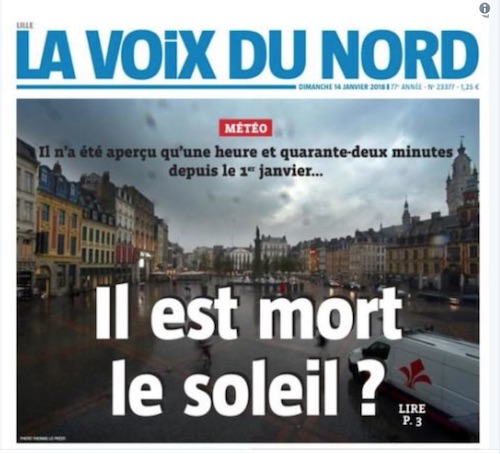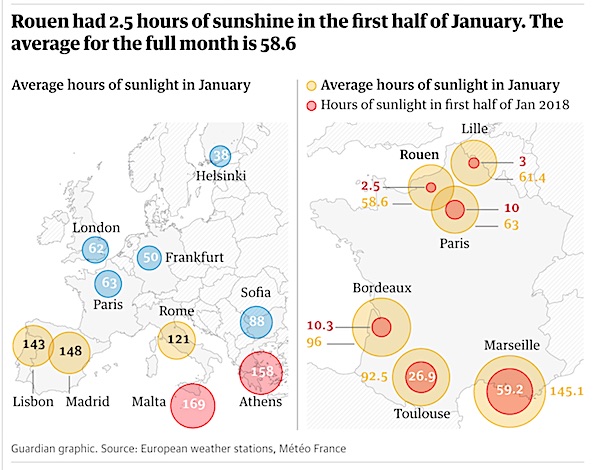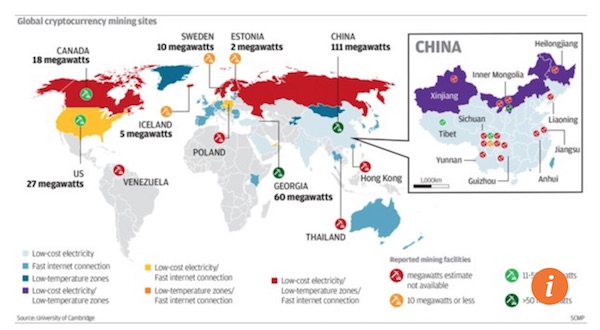
Francisco Goya The Dog 1819-23

Let it go down; why maintain the illusion that the system functions?
• US Senate In Weekend Bid To End Shutdown Impasse (BBC)
The US Senate is due back in session to try to end a budget impasse before the start of the working week when the shutdown of many federal services will be felt around the country. Hundreds of thousands of federal staff face the prospect of unpaid leave. On Saturday, recriminations flew around over the Senate’s failure to pass a new budget and prevent the shutdown. A bill to fund the federal government for the coming weeks did not receive the required 60 votes by Friday. The Republican leader of the US Senate, Mitch McConnell, has said there will be a vote at 01:00 in the early hours of Monday (06:00 GMT) on a bill to fund the government until 8 February. The last government shutdown was in 2013, and lasted for 16 days.
This is the first time a government shutdown has happened while one party, the Republicans, controls both Congress and the White House. The vote on Friday was 50-49, falling far short of the 60 needed to advance the bill. With a 51-seat majority in the Senate, the Republicans do not have enough votes to pass the bill without some support from the Democrats. They want funding for border security – including the border wall – and immigration reforms, as well as increased military spending. The Democrats have demanded protection from deportation of more than 700,000 undocumented immigrants who entered the US as children.

No gloating.
• Trump’s Trip To Davos Is Up In The Air Because Of The Shutdown (CNBC)
Donald Trump was set to be the first U.S. president to attend the World Economic Forum in Davos, Switzerland, in nearly two decades, but the government shutdown might have scrambled those plans. White House budget chief Mick Mulvaney said Saturday that Trump’s plans to travel to Davos next week are up in the air while Congress scrambles to strike a deal to fund the federal government. “We’re taking Davos, from the president’s perspective and the Cabinet’s perspective, on a day-by-day basis,” Mulvaney told reporters during an impromptu briefing. The government shut down at midnight Friday, after congressional negotiators failed to pass a budget.
Earlier in the day, Trump cancelled a planned trip to Florida, where he was scheduled to host a party at his private Mar-a-Lago club to mark the one year anniversary of his inauguration. Tickets for the Mar-a-Lago party begin at $100,000 per couple, and proceeds will benefit the Trump reelection campaign and the Republican National Committee. On Saturday, RNC staffers were busy setting up TV screens in the private club, so Trump could address the guests via satellite, according to CNN. The budget impasse showed no signs of letting up on Saturday, as both Democrats and Republicans dug their heels in, and each party blamed the other. The president is scheduled to depart for Switzerland on Wednesday, along with a delegation of more than a dozen Cabinet members, including Treasury Secretary Steven Mnuchin, and top White House aides.

They have to release it, no choice.
• Republicans Have Four Easy Ways to #ReleaseTheMemo – and the Evidence (GG)
One of the gravest and most damaging abuses of state power is to misuse surveillance authorities for political purposes. For that reason, The Intercept, from its inception, has focused extensively on these issues. We therefore regard as inherently serious strident warnings from public officials alleging that the FBI and Department of Justice have abused their spying power for political purposes. Social media last night and today have been flooded with inflammatory and quite dramatic claims now being made by congressional Republicans about a four-page memo alleging abuses of Foreign Intelligence Surveillance Act spying processes during the 2016 election.
This memo, which remains secret, was reportedly written under the direction of the chair of the House Permanent Select Committee on Intelligence, GOP Rep. Devin Nunes, and has been read by dozens of members of Congress after the committee voted to make the memo available to all members of the House of Representatives to examine in a room specially designated for reviewing classified material. The rhetoric issuing from GOP members who read the memo is notably extreme. North Carolina Republican Rep. Mark Meadows, chair of the House Freedom Caucus, called the memo “troubling” and “shocking” and said, “Part of me wishes that I didn’t read it because I don’t want to believe that those kinds of things could be happening in this country that I call home and love so much.”
GOP Rep. Scott Perry of Pennsylvania stated: “You think about, ‘Is this happening in America or is this the KGB?’ That’s how alarming it is.” This has led to a ferocious outcry on the right to “release the memo” – and presumably thereby prove that the Obama administration conducted unlawful surveillance on the Trump campaign and transition. On Thursday night, Fox News host and stalwart Trump ally Sean Hannity claimed that the memo described “the systematic abuse of power, the weaponizing of those powerful tools of intelligence and the shredding of our Fourth Amendment constitutional rights.” Given the significance of this issue, it is absolutely true that the memo should be declassified and released to the public — and not just the memo itself.
The House Intelligence Committee generally and Nunes specifically have a history of making unreliable and untrue claims (its report about Edward Snowden was full of falsehoods, and prior claims from Nunes about “unmasking” have been discredited). Thus, mere assertions from Nunes — or anyone else — are largely worthless; Republicans should provide American citizens not merely with the memo they claim reveals pervasive criminality and abuse of power, but also with all of the evidence underlying its conclusions.

Don’t worry, the shadow banks will.
• China Orders Banks To Stop Financing Cryptocurrencies (SCMP)
The People’s Bank of China has ordered financial institutions to stop providing banking or funding to any activity related to cryptocurrencies, further tightening the noose since its shutdown of crypto exchanges last September sent digital currency enthusiasts fleeing overseas. “Every bank and branch must carry out self-inspection and rectification, starting from today,” according to a document issued by the central bank on Wednesday. “Service for cryptocurrency trading is strictly prohibited. Effective measures should be adopted to prevent payment channels from being used for cryptocurrency settlement.” The Chinese-language document, as seen by the South China Morning Post, was distributed as an internal document among banks, and not published on the central bank’s official website.
“Banks should enhance their daily transaction monitoring, and the timely shut down of the payment channel once they discover any suspected trading of cryptocurrencies,” the document said, adding that the deadline for disclosing the measures is on January 20. The emphasis was on handling any capital settlement to avoid any financial losses by cryptocurrency investors from escalating into public protests – known as “group events” in China – and preserve social stability, the central bank said. [..] Chinese cryptocurrency traders, who once dominated 90 per cent of the world’s trading volume of bitcoin, the most popular and oldest form of cryptocurrency, have moved to the underground market, or overseas to Japan. Bitcoin is considered legal tender in Japan.
“Most of the trading is taking place via US dollar now, as some big accounts active in digital currency trading are already on China’s official watch list and payment channel already blocked,” said Zhao Dong, an individual bitcoin investor who spends most of his time in Japan now. “This move by the PBOC is further pushing capital and innovation out of China.” Still, a person no less than Zhou Xiaochuan, the longest-serving governor in the Chinese central bank, has himself announced that the People’s Bank of China itself is studying the feasibility of developing its own digital currency.

As does Russia.
• China Urges U.S. to Abandon ‘Cold War’ Mindset (BBG)
China’s National Defense Ministry said the U.S. should abandon a “Cold War” mindset and view Chinese national security and military efforts “rationally and objectively.” The instigators of militarization of the South China Sea are “other countries” that don’t seem to want to see peace in the region and are using the banner of “navigational freedom” to undertake military activities in a tyrannical manner, ministry spokesman Ren Guoqiang said in a statement released late Saturday. The statement was in response to a U.S. Defense Department strategy report, released last week, that singled out China’s military modernization and expansion in the South China Sea as key threats to U.S. power.
China has undertaken massive land reclamation in the contested waterway that hosts $5 trillion in trade a year, to strengthen its claim to more than 80 percent of the area. That has strained ties with other claimant states, such as Vietnam and the Philippines, as well as the U.S. The National Defence ministry’s statement on Saturday came shortly after China’s Foreign Ministry vowed to take “necessary measures” to safeguard its sovereignty after a U.S. warship entered waters surrounding the Huangyan Island in the South China Sea. China’s activities in the South China Sea is “a matter within China’s sovereign rights,” Ren said, adding that the country is committed to a path of peaceful development and a harmonious world order.

A good point not particularly well made.
• Britain’s Tired Old Economy Isn’t Strong Enough For Brexit (G.)
Brexit, at its heart, is a recognition that Britain has become steadily weaker since it spent much of its empire wealth fighting two world wars – too feeble in the years before the 2016 referendum to sustain an exchange rate of $1.60 and €1.40, just as it was too poor to cope with $4 to the pound in the 1950s and $2 to the pound in 1992. Manufacturers were unable to make things cheaply, reliably or efficiently enough against the headwind of a high-value currency, forcing many to give up. An economy that boasted 20% of its income coming from manufacturing in the 1980s found it was the source of barely 10% at the beginning of this decade.
Surges in GDP growth in the 70 years since the war can be attributed (and this short list makes the point crudely) to periods when there were cheap raw materials and energy costs; or a growing population; or foreign ownership and management of key industries; or the offloading of vast amounts of state and mutually owned assets; or cheap borrowing. Without these in operation to improve the UK’s performance, a lower exchange rate became inevitable. Some Brexit campaigners made a cheaper currency their explicit aim, arguing that while Britain’s wealth and standing in the world would be diminished in the short term, the breathing space given to manufacturers would allow them to sell abroad at cheaper prices, then use the funds to invest and gain the efficiencies needed to cope with a return to a higher exchange rate sometime in the next decade.
There is a good deal of logic to the argument, but it rests, like so many revolutionary aims, on the many and competing forces in the economy doing exactly what its proponents want them to. For instance, manufacturers, with a few honourable exceptions, have refused to invest more than the bare minimum for decades, even when the exchange rate has helped them. There are windfall profits to be made when currencies fall: but these windfalls have been trousered by shareholders, not invested.

Little emperor.
• Macron: Bespoke Brexit Deal Possible If UK Accepts ‘Preconditions’ (G.)
Emmanuel Macron has said it would be possible for Britain to secure a bespoke trade deal but only if the UK accepts certain “preconditions”. The French president said that while a special solution could be secured, full access to the single market without accepting its rules was “not feasible”. The comments were made during an interview recorded for BBC One’s The Andrew Marr Show on Sunday. Macron has been in the UK for his first visit since taking office. On Thursday, at the end of a joint press conference with Theresa May at Sandhurst military training college, he rejected the idea of a tailored Brexit deal for Britain’s financial services sector. Macron said full access to EU markets would not be possible unless the UK paid into the EU budget and accepted all its rules.
In the interview with Marr, he said there was “a competition between different countries” to attract financial services companies in the future and that France wanted “to attract the maximum activity”. The Brexit secretary, David Davis, has said he is seeking a “Canada plus plus plus” arrangement, based on the EU-Canada trade treaty, but with additional access for services. However, EU negotiators have stressed that Britain would not be allowed to “cherry-pick” sectors. Pressed on whether there would be a bespoke special solution for the UK, Macron said: “Sure, but … this special way should be consistent with the preservation of the single market and our collective interests. “And you should understand that you cannot, by definition, have the full access to the single market if you don’t tick the box.” He added: “So it’s something perhaps between this full access and a trade agreement.”


It’s starting to feel like Stockholm Syndrome.
• Athens Hopeful For Eurogroup Decisions Despite Problems (K.)
Eurozone finance ministers are to meet in Brussels on Monday to assess Greece’s progress in enforcing economic reforms, decide whether to disburse 6.7 billion euros in bailout loans and, Athens hopes, signal talks on debt relief. It was unclear if the loan tranche would be disbursed in its entirety, as some prior actions are pending. However, Greek officials sounded upbeat following a decision late on Friday by Standard & Poor’s to raise Greece’s sovereign credit rating from B- to B with a positive outlook. “Greece’s growth and fiscal outlooks have improved alongside a labor market recovery and amid a period of relative policy certainty,” S&P said.
“These positive developments boost the sense that the trust of the markets and investors in the Greek economy is being restored with steady steps,” the Finance Ministry said on Saturday. “With the conclusion of the program in August 2018 and the securing of steady access to the markets, the Greek economy is definitely moving away from a long period of crisis.” Despite the upbeat rhetoric, there are divisions within SYRIZA over government policies, particularly in the radical Group of 53 faction. In comments to SYRIZA’s central committee on Saturday, Finance Minister Euclid Tsakalotos conceded that there are “many short-term problems” and underlined two major risks. “One is the banks and the other is the IMF,” he said.

Nice. Kiwis believe in fairy tales.
• In New Zealand, 100% Pure Is 100% Propaganda (Stuff)
Ask Tourism New Zealand what 100% Pure means and they’ll tell you: it’s not a ‘clean, green’ campaign, but a campaign that delivers a “100% Pure New Zealand experience”. What it is is 100% pure advertising, and a slogan fit to replace the fertiliser used in the country’s intensive farming. But while Kiwis do seem to be realising there’s something murky about our clean-green image, there is one area we are still fooling ourselves about – the state of our native creatures. Stuff has just wrapped up its Forgotten Species series, a five-part series looking at a handful of the estimated 3700 native species which are either approaching extinction or at risk. Despite having one of the highest proportions of threatened or endangered species of anywhere on the planet, 70% of the public feel the state of our country’s natives is adequate or doing well, according to a recent Lincoln University study.
Ask study co-author Ross Cullen and he will tell you – 70% of the public is “totally wrong”. All countries advertise, and everyone accepts it with a pinch of salt. If we didn’t we would all be jetting off to England expecting a village in the Cotswolds and end up at a sleazy pub in Plumstead, east London. Advertising is advertising, and good advertising brings in tourism money. However, when the public believes its own advertising, it’s no longer advertising, it’s propaganda –and that’s a problem. It’s a problem because if the populace think something’s going well, they ignore it, the political hot-potato cools, and the decline continues. Case in point – the National Government’s Minister for Conservation, Maggie Barry, paraded the new Threatened Species Strategy in front of voters just as the 2017 general election was heating up.

It promised to increase the number of at-risk species directly managed by 40%. On the face of it, this seems great, but when the Budget was released a couple of weeks later, almost all of DOC’s extra funding was ring-fenced for upgrading tourism infrastructure and developing new Great Walks. It was a great ad delivered by a great ex-garden show host. Kiwis might have kicked up a fuss – if the majority didn’t think we were doing a bang up job on protecting native species already. I remember a telling moment after ex-Parliamentary Commissioner for the Environment Jan Wright’s launched her report finding 80% of native birds were threatened. I was present to hear why Tourism Industry Aotearoa chief executive Chris Roberts didn’t fancy this was a problem. “The people come here for our scenery, not our wildlife,” he said. Roberts didn’t disagree with any of the report’s findings, he just thought a visitor levy would do more harm to the country than the rapid die-off of our native birds.

Depression zone. I went from Athens to Amsterdam 5 weeks ago, lost 2 hours of daylight to begin with, and been dead tired ever since. Vitamin D doesn’t do it either.
• Ain’t No Sunshine: Winter Is One Of Darkest Ever For Parts Of Europe (G.)
Sunshine is in short supply across a swathe of north-west Europe, shrouded in heavy cloud from a seemingly never-ending series of low pressure systems since late November and suffering one of its darkest winters since records began. If you live in Brussels, 10 hours and 31 minutes was your lot for the entire month of December. The all but benighted inhabitants of Lille in France got just two hours, 42 minutes through the first half of January. “Sound the alarm and announce the disappearance,” read a despairing headline in photon-deprived northern France’s regional paper, La Voix du Nord. “A star has been kidnapped. We still have no sign of life from the sun.”

Belgium’s Royal Meteorological Institute has declared December 2017 “the second darkest month since 1887”, when it began measuring, after the 10.5 hours of sun recorded at its Uccle weather station last month were beaten only by a bare 9.3 hours in 1934. France’s northern Hauts-de-France region did better with 26 hours of sunshine in December, but that was against a norm of 48. But Météo France described the paltry 2.7 hours of sun recorded from 1 to 13 January in Lille, the region’s biggest city, as “exceptional”. The January average stands at 61.4 hours, according to the agency – meaning Lille and its unfortunate residents were deprived of perhaps 30 hours’ worth of rays in the first part of the month.

[..] Even southern French sun-traps such as Bordeaux and Marseille fell a very long way short of their usual ray quota in the first half of the month, basking in just 10.3 and 26.9 hours respectively against monthly averages of 96 and 92.5. Health experts say a shortage of sunshine can lead to seasonal depression, whose symptoms include a lack of energy, a desire to sleep and a perceived need to consume greater quantities of sugar and fat. “Exposure to morning light inhibits the secretion of melatonin that promotes sleep and favours the production of hormones that will stimulate the body,” Matthieu Hein, a psychiatrist at the Erasmus Hospital in Brussels, said. In the absence of light, we are “rather slow, tired, which is characteristic of SAD, or seasonal affective disorder”. Florent Durand, who runs a massage studio in Lille, told France 3 TV that his €39 light therapy sessions were booked out.

As Turkey bombs US supported Kurds, Erdogan feels like a god.
• Turkey Threatens Refugee Deal With EU (K.)
Turkey’s agreement with the European Union to curb human trafficking across the Aegean appears to be in jeopardy again after a top Turkish official warned that a current impasse with the EU gives Ankara no reason to honor the deal. A collapse of the deal would put more pressure on Greek islands where thousands of migrants are cooped up in overcrowded reception centers. The comments on Friday by Turkey’s minister for EU affairs, Omer Celik, essentially rejected a proposal by French President Emmanuel Macron for a partnership rather than full EU membership for Turkey. “A privileged partnership or similar approaches, we don’t take any of these seriously. Turkey cannot be offered such a thing,” Celik told Reuters.
Celik said the EU was not fully honoring its part of the migration deal, noting that financial aid was “not working well” and that no new chapters have been opened in Turkey’s EU accession bid. “Technically there’s no reason for Turkey to maintain this deal,” he said. The minister’s words echoed those of Turkish President Recep Tayyip Erdogan, who, during a landmark visit to Greece in December, hit out at the EU for giving Turkey just a portion of the aid it had pledged as part of the 2016 migrant deal. During Erdogan’s visit, Prime Minister Alexis Tsipras proposed that Turkey take back migrants from facilities on the Greek mainland to free up space for migrants from overcrowded camps on the islands. Erdogan did not publicly respond to the suggestion.
After Celik’s comments on Friday, a spokesman for the Greek Migration Ministry said the government’s position, that all sides must honor the Turkey-EU deal, remained “fixed and firm.” Migration Minister Yiannis Mouzalas visited Lesvos on Friday, together with Valentin Radev, the interior minister of Bulgaria, which holds the EU’s rotating presidency. Mouzalas reassured local residents, who had gathered at the Moria facility, that measures would be taken to ensure that migrants alleged to have been involved in thefts or other offenses will no longer be allowed to leave the premises. Lesvos Mayor Spyros Galinos said the minister was not doing enough to adequately inform residents and was shifting the blame for the situation on the islands on to local authorities.

New year, same old lack of humanity.
• 15 Syrian Refugees Found Frozen To Death On Lebanon Border (BBC)
Fifteen Syrian refugees – some of them children – have been found frozen to death while trying to cross the mountainous border into Lebanon. Thirteen bodies were found on Friday and two more were discovered on Saturday after the area was hit by a fierce snowstorm. Lebanese civil defence officials found the bodies after being told a group of refugees were in trouble near Masnaa. Local reports say the group had been abandoned by smugglers. Two smugglers have reportedly been arrested.
Several refugees were rescued, including a young boy who was found wandering by himself. The group were taking the same route hundreds of thousands of Syrians have taken before them trying to flee the conflict at home. Lebanon, with a population of four million, has taken in nearly one million Syrians since the war began in 2011. The Lebanese authorities brought in new restrictions in 2015 to try to restrict the number of refugees arriving in the country.










Home › Forums › Debt Rattle January 21 2018